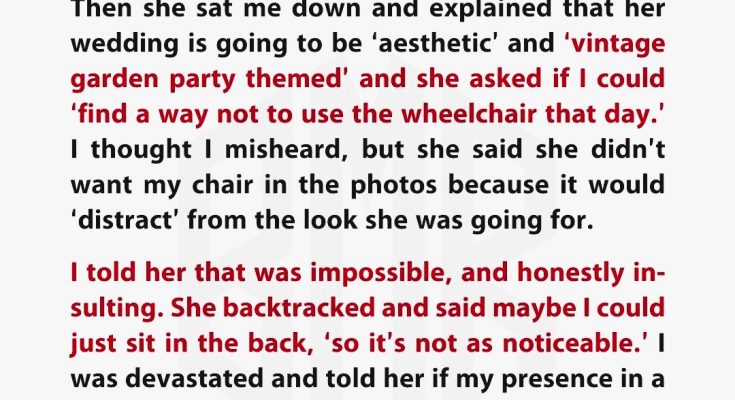I was thrilled when my sister asked me to be a bridesmaid at her upcoming wedding. As someone who’s been in a wheelchair since I was 19, it felt like a beautiful gesture of inclusion. But that joy shattered when she sat me down and asked if I could “find a way not to use the wheelchair” on her big day. She said it would “distract” from the vintage garden party aesthetic she envisioned. I was stunned. My wheelchair isn’t a prop—it’s part of me. Her request felt like a rejection of who I am.
I told her it was impossible and deeply hurtful. She backtracked, suggesting I sit in the back so I wouldn’t be “as noticeable.” That crushed me. I’d always believed our bond was stronger than appearances. If my presence in a wheelchair embarrassed her, I wouldn’t attend at all. My decision sparked chaos. My mom supported me, but my dad said I was being dramatic and should “just compromise for one day.” My sister cried, accusing me of ruining her wedding. But I couldn’t betray myself for a photo op.
The fallout was brutal. Relatives took sides, and the tension grew unbearable. I questioned whether I was being selfish or standing up for something bigger. But the truth is, asking someone to hide their disability for aesthetics is not just inconsiderate—it’s cruel. I wasn’t trying to sabotage her day; I was defending my dignity. If she couldn’t accept me fully, then maybe I didn’t belong in her perfect picture. I chose self-respect over forced harmony.
Reddit users rallied behind me, calling out the absurdity of her request. Some shared stories of inclusive weddings where wheelchairs were embraced, not hidden. Their support reminded me I wasn’t alone. This wasn’t just about a wedding—it was about visibility, respect, and unconditional love. My sister’s rule exposed a deeper truth: sometimes, the people closest to you can fail to see you clearly. And when they do, you have every right to walk—or roll—away.

